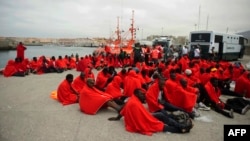The U.N. refugee agency is urging Spain not to legalize automatic returns of people trying to cross into its enclaves of Ceuta and Melilla located in North Africa. The UNHCR said stripping people of their right to request asylum could put Spain in breech of the 1951 Refugee Convention.
The U.N. refugee agency said people who are seeking international protection should have the possibility of being heard and their claims for asylum assessed by competent authorities. The agency said this basic right is being put at risk by a proposal by Spain to automatically return people without proper documentation when they try to cross fences into its enclaves of Ceuta and Melilla in North Africa.
The two Spanish cities are the only land borders between the European Union and Africa. UNHCR spokesman William Spindler said there has been an increase in the number of people arriving irregularly through this route since 2013.
“As a response to the influx, Spain’s ruling Popular Party (PP) has proposed an amendment to current law to be applied exclusively at the Ceuta and Melilla borders," said Spindler. "The proposal introduces the concept of “rejection at the border” [“rechazo en frontera” in Spanish], and aims at legalizing the current practice of push-backs. This practice would not provide any opportunity for those fleeing persecution and conflict to request asylum.”
Spindler said there has been an increase in the proportion of those coming to Ceuta and Melilla from countries torn by war, violence and persecution. He said 60 percent are from Syria, Central African Republic, Mali, and the Democratic Republic of Congo.
In 2013, he said about 4,200 people entered the enclaves irregularly by land and sea. So far this year, he says more than 5,000 people have arrived. This includes 2,000 fleeing the conflict in Syria, most of them women and children.
The UNHCR spokesman told VOA, however, not all those arriving are likely to be refugees. He noted that many make the journey for economic reasons.
“In the case of people who are coming mainly for economic reasons to Europe, our position is that whatever regulations and immigration controls should be applied to them," said Spindler.
"And, if they do not apply for asylum or they do not qualify for asylum, they can be returned to their countries of origin. This, however, is not the case for refugees because as we know, refugees might be in danger," he said. "Their lives or their freedom could be in danger if they are returned to their countries of origin.”
Spindler notes Spain is a party to the 1951 Refugee Convention. As such, he says the government must comply with its international legal obligations to allow people to state their case for asylum. Those who qualify for refugee status, he says, must be given international protection.




